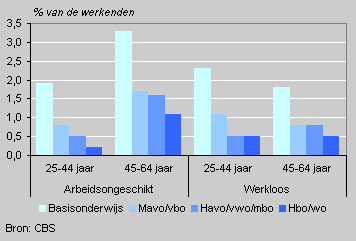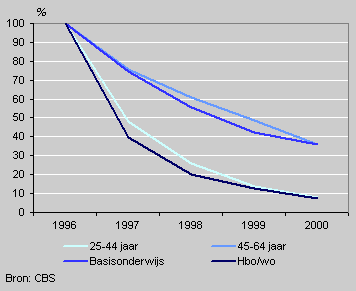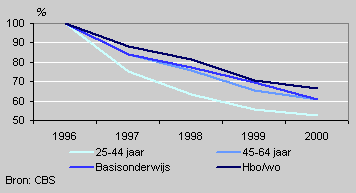Higher education level: short unemployment, longer periods of disability

Age and educational level are two factors determining dependence on a benefit. This is true for both unemployment and disability benefits. Older people and people with a low educational level are more likely to be dependent on a benefit and remain dependent on this benefit for longer than younger people and people with higher education. The only exception is the group of higher educated disabled people, who remain dependent on disability benefit for a relatively long period. This can be concluded from the results of a survey conducted jointly by the Organisation for strategic labour market research and Statistics Netherlands.
Inflow by age and education
People with a low level of education were relatively often dependent on an unemployment or disability benefit. Among older people, the percentage with only primary education depending on a benefit with was three times as high as among the higher educated. Among younger people the differences by educational level were even greater.
Inflow in unemployment and disability, 2000

Older and low educated: less outflow from unemployment
More than half of people who became dependent on unemployment benefit in 1996 were still dependent on this benefit one year later. The outflow of lower educated and older people from this situation was smaller than that of higher educated and younger people. This was the case after one year as well as after four years. It is worth mentioning in this respect that in the period 1996-2000 the situation on the labour market was favourable. Younger people more often returned to work than older people.
Percentage remaining dependent on unemployment benefit, inflow 1996

Higher educated unemployed for only a short period
More than one third of lower educated people who became dependent on an unemployment benefit in 1996 were still receiving this benefit in 2000. For higher educated people this was only 7 percent. This is caused by the rapid outflow of the latter group: 60 percent of people with higher education were no longer depended on an unemployment benefit one year after becoming unemployed.
Higher educated remain disabled for longer
Two-thirds of people who became dependent on an disability benefit in 1996 were still receiving this benefit in 2000. For workers with an intermediate level of education this percentage was lower. The pattern for those with the lowest levels of education is similar to that of those with the highest level of education.
Percentage remaining dependent on disability benefit, inflow 1996

About half of people who started receiving a disability benefit in 1996, and were no longer receiving this benefit in 2000, had returned to work. For people with higher education this was nearly three-quarters.
Didier Fouarge (OSA)